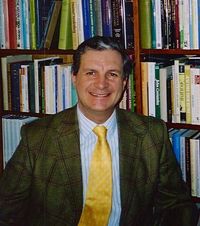Loading AI tools
British historian (1953–2012) From Wikipedia, the free encyclopedia
Nicholas Goodrick-Clarke (15 January 1953 – 29 August 2012) was a British historian and professor of Western esotericism at the University of Exeter, best known for his authorship of several scholarly books on the history of Germany between the World Wars and Western esotericism.
Nicholas Goodrick-Clarke | |
|---|---|
 Goodrick-Clarke in his office | |
| Born | 15 January 1953[1] Lincoln, Lincolnshire, UK |
| Died | 29 August 2012 (aged 59)[2] |
| Occupation | Historian, professor, writer |
| Nationality | British |
| Alma mater | University of Bristol (B.A.) St Edmund Hall, Oxford (D.Phil.) |
| Subject | History of Western esotericism |
| Notable works | The Occult Roots of Nazism (1985)[3][4] Black Sun (2001)[5][6] |
Goodrick-Clarke was born in Lincoln, UK, on 15 January 1953, and was an Open Exhibitioner at Lancing College. He studied German, politics, and philosophy at the University of Bristol, and gained a B.A. with distinction.[7] Moving to St. Edmund Hall, Oxford, Goodrick-Clarke took a D.Phil. with a dissertation on the modern Occult Revival and Theosophy at the end of the twentieth century.
Goodrick-Clarke's Ph.D. dissertation was the basis for his most celebrated work, The Occult Roots of Nazism.[3] This book has been continually in print since its first publication in 1985, and has been translated into twelve languages. Later notable works include his well-regarded Paracelsus: Essential Readings, published in 1990, and Black Sun: Aryan Cults, Esoteric Nazism, and the Politics of Identity, published in 2001.[5]
In his varied career, Goodrick-Clarke worked as a schoolmaster, banker, and a successful fundraiser for The Campaign for Oxford. In 2002, he was appointed a Research Fellow in Western Esotericism at the University of Lampeter,[7] and then in 2005 he was appointed to a personal chair in the Department of History at Exeter University. As Professor of Western Esotericism and Director of the Exeter Centre for the Study of Esotericism (EXESESO), he developed a successful distance-learning M.A. in Western Esotericism and successfully supervised a number of doctoral students. While at Exeter he wrote The Western Esoteric Traditions: A Historical Introduction, published in 2008.
In 1983, Goodrick-Clarke was one of the founder members of "The Society", an informal London-based association of professional and amateur scholars of esotericism, including Ellic Howe, the publisher Michael Cox, John Hamill, and the scholar of Rosicrucianism, Christopher McIntosh. He was a founding member of both the European Society for the Study of Western Esotericism and the Association for the Study of Esotericism (ASE), in America. He was a faculty member of the New York Open Center from 1995.
Goodrick-Clarke was the Director of the Centre for the Study of Esotericism (EXESESO) within the College of Humanities at Exeter until his death on 29 August 2012.
Seamless Wikipedia browsing. On steroids.
Every time you click a link to Wikipedia, Wiktionary or Wikiquote in your browser's search results, it will show the modern Wikiwand interface.
Wikiwand extension is a five stars, simple, with minimum permission required to keep your browsing private, safe and transparent.